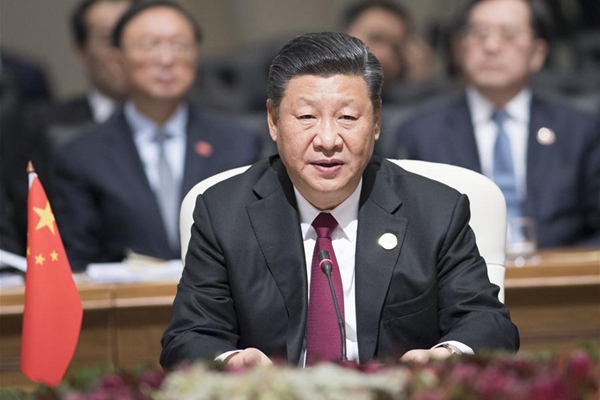Xi urges BRICS countries to deepen strategic partnership
 0 Comment(s)
0 Comment(s) Print
Print E-mail Xinhua, July 27, 2018
E-mail Xinhua, July 27, 2018

Chinese President Xi Jinping on Thursday urged BRICS countries to deepen strategic partnership and work to open up a second "Golden Decade" at the Plenary Session of the 10th BRICS summit in Johannesburg, South Africa.
The session, hosted by South African President Cyril Ramaphosa, was also attended by Brazilian President Michel Temer, Russian President Vladimir Putin, and Indian Prime Minister Narendra Modi.
The leaders of the five BRICS countries exchanged in-depth views on BRICS cooperation and major international issues of common concern under the theme "BRICS in Africa: Collaboration for Inclusive Growth and Shared Prosperity in the 4th Industrial Revolution," reaching broad consensuses.
Turn vision into reality
Delivering a speech titled "Turn Our Vision into a Reality," Xi pointed out the outstanding features of the new industrial revolution and put forward initiatives on the future development of the BRICS cooperation.
"Let us work together with the rest of the international community for an open, inclusive, clean and beautiful world that enjoys lasting peace, universal security and common prosperity," said the Chinese president.
The previous three industrial revolutions were all characterized by transformative advancement in science and technology: the rise of mechanization in the 18th century, the harnessing of electricity in the 19th century, and the advent of the Information Age in the 20th century, Xi said.
Such breakthroughs have greatly unleashed social productivity and significantly improved people's living standards, thus profoundly reshaping the course of human history, he said.
The world is experiencing another revolution in science, technology and industry, which is greater in scope and depth. New technologies, business models and industries are emerging one after another. Countries around the world have found their interests and future tied together like never before, Xi said.
"We have yet to sustain global growth with new driving forces and to address the North-South imbalance and other deep-seated structural problems," he told the session.
"What's more, constant flare-ups of geopolitical conflicts and the escalation of protectionism and unilateralism are directly affecting the external development environment of emerging markets and developing countries," he said.
The BRICS countries "must therefore have a keen grasp of the trend of our times, deepen our strategic partnership, and consolidate our cooperation framework underpinned by economic, political and security cooperation and people-to-people exchanges, so as to turn our vision of a second 'Golden Decade' into a reality," said the Chinese president.
Four-point proposal
To build the new chapter in BRICS cooperation, Xi put forward a four-point proposal.
First, he called on the BRICS partners to unlock the enormous potential of economic cooperation by stepping up trade, investment, economic, financial, and connectivity cooperation to make this pie still bigger.
They also need to work together to safeguard the rule-based multilateral trading regime, promote trade and investment liberalization and facilitation, and reject protectionism outright, Xi said.
"It is important that we continue to pursue innovation-driven development and build the BRICS Partnership on New Industrial Revolution (PartNIR) to strengthen coordination on macroeconomic policies, find more complementarities in our development strategies, and reinforce the competitiveness of the BRICS countries, emerging market economies and developing countries," he said.
Second, Xi urged the BRICS members to safeguard global peace and security, and to stay committed to multilateralism, as well as the purposes and principles of the UN Charter.
"We should call on all parties to abide by international law and basic norms governing international relations and to settle disputes through dialogue and differences through consultation," Xi said, adding that the BRICS should jointly work for a new type of international relations featuring mutual respect, equality, justice and win-win cooperation.
Third, the BRICS partners should expand people-to-people exchanges and aim at greater people-to-people connectivity and more popular support for BRICS cooperation through extensive exchanges in various areas, in order to "spread the BRICS story far and wide to further enhance the mutual understanding and traditional friendship among our people," Xi said.
Fourth, according to the Chinese president, the BRICS countries should build a network of closer partnerships.
"We may explore 'BRICS Plus' cooperation within the United Nations, the G20, and other frameworks to advance the common interests and boost the development space for emerging markets and developing countries, thus contributing more to world peace and development through broader partnerships," he said.
Strengthen partnership & guard multilateralism
Addressing the session, Ramaphosa highlighted the rising unilateralism and protectionism in the world, and their negative impact on emerging market economies and developing countries.
South Africa supports the BRICS countries in building the PartNIR, and takes the opportunity of the fourth industrial revolution to achieve greater development in the second "Golden Decade" of the BRICS cooperation, Ramaphosa said.
Facing similar development tasks, Temer said the BRICS countries should strengthen solidarity, jointly address the current risks and challenges, align their development strategies, expand cooperation fields and enhance science and technology competitiveness.
Putin said the BRICS countries are faced with a complicated and ever-changing international situation, urging them to unite and coordinate with each other, stick to multilateralism and international norms, and jointly dedicate themselves to protecting the economic order, promoting high-quality and equal development, and properly resolving regional hotspot issues through political means.
The BRICS countries should carry out closer cooperation under multilateral frameworks and boost their influence in international affairs, he said.
Calling the BRICS countries an important engine of global growth, Modi said they should actively help improve global governance, carry forward multilateralism, facilitate free trade and make globalization beneficial to all, so as to better protect the interests of developing countries.
The summit issued the Johannesburg Declaration, in which the BRICS countries sent a clear signal to preserve multilateralism and reject protectionism.
The BRICS countries decided to initiate the PartNIR and deepen cooperation in areas such as economy and trade, finance, political security and people-to-people and cultural exchanges, according to the declaration.






Go to Forum >>0 Comment(s)